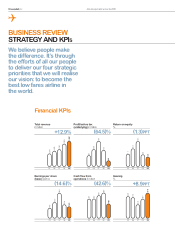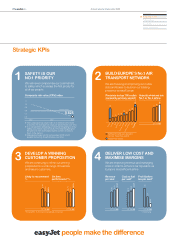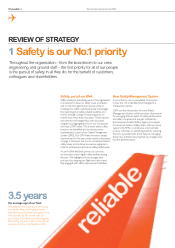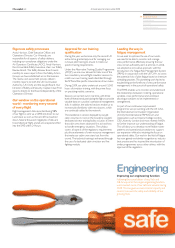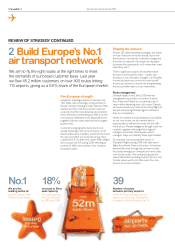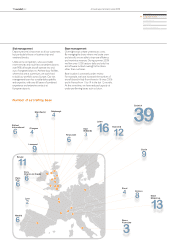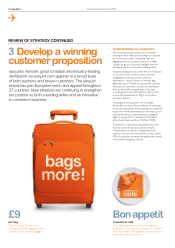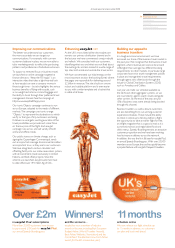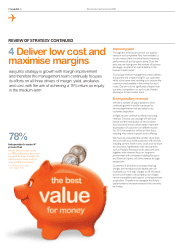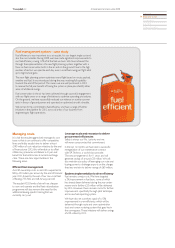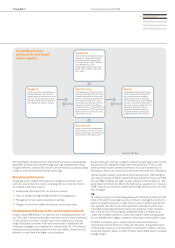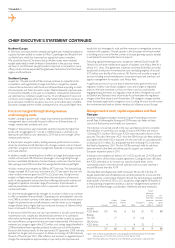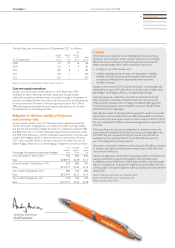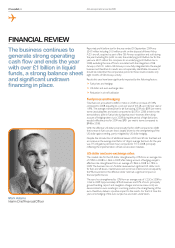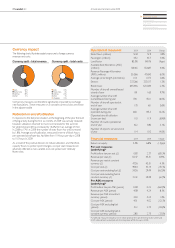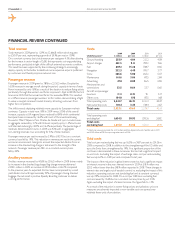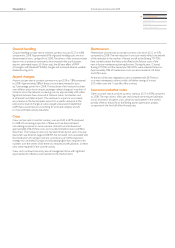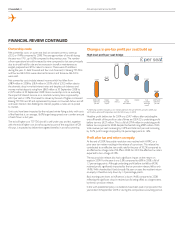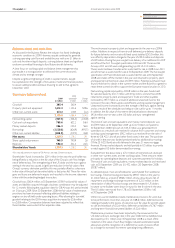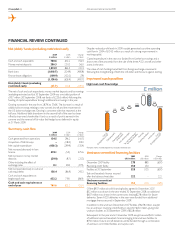EasyJet 2009 Annual Report Download - page 18
Download and view the complete annual report
Please find page 18 of the 2009 EasyJet annual report below. You can navigate through the pages in the report by either clicking on the pages listed below, or by using the keyword search tool below to find specific information within the annual report.
16 easyJet plc Annual report and accounts 2009
q
CHIEF EXECUTIVE’S STATEMENT
Introduction
This has been an important year for easyJet. The business has traded resiliently
during a recession and easyJet was one of the few airlines globally to make a
prot this year with an underlying pre-tax prot of £43.7 million. Revenue
grew by 12.9% to £2,666.8 million, this strong performance partially offsetting
the £30.5 million reduction in interest income and the £86.1 million increase
in unit fuel costs (equivalent to £1.63 per seat).
We have strengthened the fundamentals of the business, with improvements
in network quality, lower cost deals with key suppliers and enhancements to
easyJet.com giving easyJet a great platform for protable growth in the
medium-term from which to achieve a 15% return on equity. The Board has
also agreed a eet plan which will deliver around a 7.5% growth per annum in
seats own over the next ve years. This eet plan will enable easyJet to grow
its share of the European short-haul market from around 7% to 10%.
Our people
We have outstanding people, including our front line cabin crew and pilots
who are highly trained and professional. They all make a crucial contribution
to our success and help to create an easyJet personality which is an important
competitive advantage. I would like to thank them all for helping to deliver
such a resilient performance in very difcult economic circumstances. We aim
to have an open and egalitarian environment where everyone is valued for
their contribution to easyJet. We consider it important to protect and develop
this culture as the airline grows into a large pan-European business. Balancing
the imperative for cost efciency and supporting our culture in a pressurised
and uncertain economic climate has been particularly challenging in 2009.
Marketplace review
easyJet operates the leading network in European short-haul aviation,
measured by presence on the top 100 routes. Around 200 carriers compete
in the European short-haul market and the top ve players, including easyJet,
account for around 60% of seats own with the rest of the market being
highly fragmented.
Whilst the average growth of the market over the past 20 years or so has
been 4.5% per annum, in the past year overall capacity in the European
short-haul market shrank by around 5% as airlines sought to mitigate losses
driven by higher fuel costs and falling demand. easyJet continued its strategy
of carefully targeting growth in markets from which weaker competitors are
retreating in this period of recession. Thus easyJet is building strong,
defendable market positions that will ensure it is well positioned for protable
growth once the European economy improves.
Consequently, easyJet gained market share in the year and passenger numbers
grew by 3.4% to 45.2 million and load factor improved by 1.4 percentage
points to 85.5%. easyJet strengthened its position in a number of valuable
markets including Paris, London Gatwick, Milan and Madrid, increasing its slots
at constrained airports by over 10% in the year.
Regulatory update
In March 2009, the UK Competition Commission conrmed that BAA would
be required to sell a number of its airports. Whilst easyJet welcomes the
break-up of BAA and the recently conrmed sale of Gatwick, the London
airports will continue to be monopolies, regardless of who owns them, due to
the lack of spare capacity in the market. The sale highlights the need for tough
and effective airport regulation to protect airlines and passengers from the
new owners exploiting their market power.
easyJet continues to advocate the immediate reform of UK Air Passenger
Duty (APD), which taxes passengers rather than ights, into an emissions-
based tax, and the phasing out of APD when aviation joins the European
Emission Trading Scheme (EU ETS) in 2012. easyJet was an early advocate of
aviation’s entry into the EU ETS as an international, market-based solution to
ensuring aviation addresses its climate change responsibilities. We now look to
Andrew Harrison
Chief Executive
This is an exceptionally
resilient performance, which
is a tribute to the strength
of our business model and
the quality of our people
and our network.


